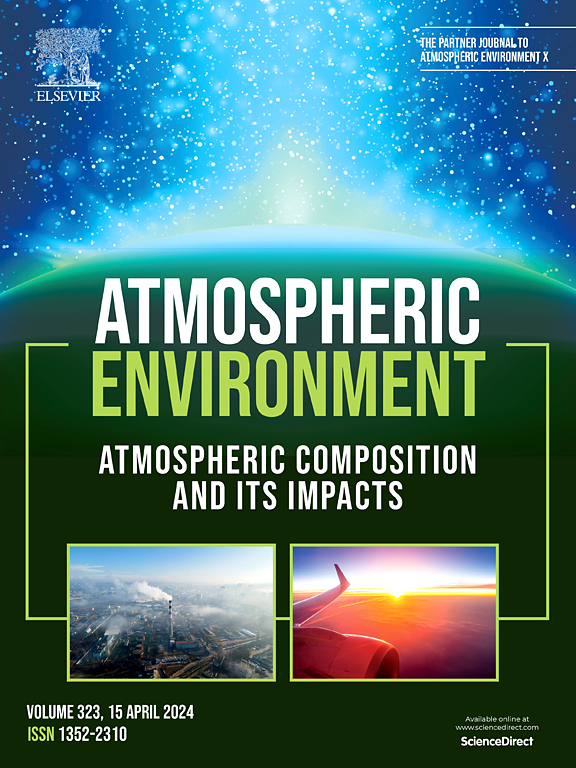未来更干旱气候下地中海落叶林土壤挥发性有机化合物的减少
IF 4.2
2区 环境科学与生态学
Q2 ENVIRONMENTAL SCIENCES
引用次数: 0
摘要
生物挥发性有机化合物(BVOC)对生态系统功能、大气化学和气候至关重要。虽然生物和非生物因素对活体植被的生物挥发性有机化合物排放的调节作用已被充分记录,但人们对这些因素如何驱动土壤生物挥发性有机化合物排放的了解仍然较少,尤其是在地中海森林中。为了填补这一空白,这项开创性的研究调查了在落叶橡树地中海森林(Quercus pubescens Willd.)中,与自然气候条件相比,枯落物覆盖的天然土壤(称为森林土壤)的 BVOC 通量在自然和放大的长期水胁迫(过去 10 年中年均降雨量减少 35%)条件下是否会发生变化。迄今为止,只有一片常绿地中海森林实现了这一目标。利用质子转移反应飞行时间质谱仪(PTR-ToF-MS),我们还首次提供了土壤中 BVOCs 与空气温度、空气湿度和生物因素(包括土壤呼吸和枯落物中木质素、纤维素和半纤维素的含量)相关的详细昼夜周期。主要结果表明,森林土壤是大多数 BVOCs(如乙醛、丙酮、丙烯醛、己醇、单萜烯)的来源,其最大值出现在中午(42 μgC.m-2。部分降雨限制十年后,土壤 BVOC 排放总量和土壤呼吸量减少了 43%。这些结果将有助于进一步模拟区域和全球范围内各种气候情景下的土壤 BVOC 排放。本文章由计算机程序翻译,如有差异,请以英文原文为准。
Decline of soil volatile organic compounds from a Mediterranean deciduous forest under a future drier climate
Biogenic volatile organic compounds (BVOCs) are crucial for ecosystem functioning, atmospheric chemistry and climate. While modulation of BVOC emissions from living vegetation with biotic and abiotic factors is well documented, how these factors drive soil BVOC emissions remain less understood, particularly in Mediterranean forests. To fill this gap, this pioneer study investigates whether BVOC fluxes from natural soil covered by litter (referred to as forest soil) vary under natural and amplified long-term water stress (35% annual rain exclusion over the past 10 years) in a deciduous oak Mediterranean forest (Quercus pubescens Willd.) compared to natural climate conditions. This aim has only been tackled in a single evergreen Mediterranean forest so far. Using proton transfer reaction time of flight mass spectrometer (PTR-ToF-MS) we also provide, for the first time, a detailed diurnal cycle of soil BVOCs in relation to air temperature, air humidity, and biotic factors including soil respiration and litter content in lignin, cellulose and hemicellulose. The main results revealed that forest soil represents a source of most BVOCs (e.g., acetaldehyde, acetone, acrolein, hexanol, monoterpenes) with maximum values at mid-day (42 μgC.m−2. h−1) in response to higher temperatures while it acts as a clear sink of isoprene. Total soil BVOC emission rates, together with soil respiration, decreased by 43% after a decade of partial rain restriction. These results will contribute to enhance further modeling of soil BVOC emissions under various climate scenarios both at regional and global scales.
求助全文
通过发布文献求助,成功后即可免费获取论文全文。
去求助
来源期刊

Atmospheric Environment
环境科学-环境科学
CiteScore
9.40
自引率
8.00%
发文量
458
审稿时长
53 days
期刊介绍:
Atmospheric Environment has an open access mirror journal Atmospheric Environment: X, sharing the same aims and scope, editorial team, submission system and rigorous peer review.
Atmospheric Environment is the international journal for scientists in different disciplines related to atmospheric composition and its impacts. The journal publishes scientific articles with atmospheric relevance of emissions and depositions of gaseous and particulate compounds, chemical processes and physical effects in the atmosphere, as well as impacts of the changing atmospheric composition on human health, air quality, climate change, and ecosystems.
 求助内容:
求助内容: 应助结果提醒方式:
应助结果提醒方式:


